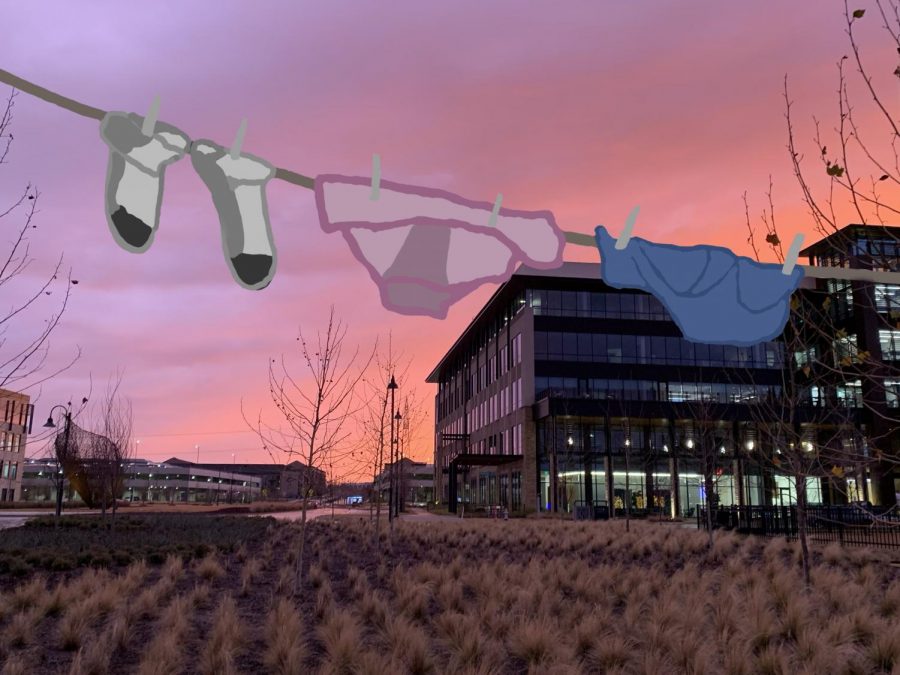‘Nomadland’s’ contemporary vision of the American dream
NYU alumna and best picture winner Chloé Zhao’s “Nomadland” interrogates the nature of coming of age in modern America.
Nomadland is a drama film written, edited, produced, and directed by Chloé Zhao. This best picture winner film follows a woman who leaves her hometown, after her husband dies and she loses her job, to be “houseless” and travel around the United States. (Staff Photo by Manasa Gudavalli, Staff Illustration by Manasa Gudavalli)
April 26, 2021
“I’m not homeless, I’m just houseless. Not the same thing, right? Don’t worry about me; I’m okay,” Fern says to Makenzie in “Nomadland.” The distinction between what it means to be homeless and houseless is reiterated multiple times in Jessica Bruder’s “Nomadland,” a work of nonfiction literature that follows the lives of those traversing the United States in vans. They are mostly senior citizens in search of employment, seeking the fulfillment of dreams they were unable to realize in a middle age of nine-to-five jobs and raising families. The self-made map of temporary dwellings and permanent wandering, wherein the road itself has become a home, defies the typical, reliable structure of a middle-class American dream.
The geographer-scholar Doreen Massey described “place as a process,” a philosophy that perfectly frames the adaptation of Bruder’s book into recent writer-director Chloé Zhao’s latest film, featuring Frances McDormand, who took home an Academy Award for Best Actress, as the itinerant Fern. Fern is immediately compelling under Zhao’s direction, transcending the Tisch graduate’s celebrity to observe the breathtaking strength and solitude residing in the American West’s fabled landscapes. The idea that Fern could be anyone is matched by the possibility of place being anywhere, as Zhao’s arrestingly beautiful shots (brought to life by frequent collaborator and cinematographer Joshua James Richards) build on the freedom that is resonant in both of her previous feature films, “Songs My Brothers Taught Me” (2015) and “The Rider” (2017).
The land is its own character, guiding Fern to face personal tragedy and immerse herself in the superficial impressions of non-places. Anonymity abounds in a one-car-population highway, in the valleys of a national park where gray rock folds in on itself over and over with a meditative simplicity. The places Fern traverses — a gas station on a frigid winter evening, a lone patch of gravel dotted by cacti — may be sparsely inhabited, may be untouched, may be nameless, but these are the qualities which begin to shape Fern.
Fern may be houseless, but she builds a new home with the friends she meets on the road. There’s spry and funny Linda May, stubborn and loyal Swankie, and young and goodhearted Derek, who seems to arrive just when Fern most needs a cigarette. Their times together are brief yet full through their shared learning and understanding of each other. All supporting characters are played by real-life nomads, most of whose stories are featured in Bruder’s book. All of them are nomads, but none of them are placeless. Places change as imprints of the past rewrite its history over and over again. These nomads, travelers and vandwellers leave behind traces of themselves in each place: a piece of their spirit which is awoken in the person who takes their place in a cyclical journey of discovery.
Fern carries the dreams, stories and lessons of her wandering kin with her. They provide the compass Fern uses to orient her captivating restlessness on the still surface of the land in all its captivating restlessness. Home requires a journey of return, though the construction of home is a forward-looking process of imagination and transformation. The dividing line between future and past remains entirely flexible — one inhabits a space somewhere between what once was and what still might be.. Even when Fern leaves behind a patch of land in South Dakota or Nevada or Nebraska or Arizona, the feeling of home remains within the viewer. She can return to it again and again, and it is precisely this process of revisiting that proves she is far from done growing, even though her age would suggest otherwise.
McDormand transcribes an unwavering honesty into every part of her face. The twitch of her smile betrays an inner aching. In the creases of the corners of her eyes resides a sense of bittersweet longing. Its acute intensity lies in her power to express an emotion that is too big for words yet still universally understood. The use of poetic cinema techniques grants the film an air of myth, colored by the vast stretches of a lavender-and rose-tinged dusk suspended above a desert that expands to the edge of the horizon. The sight and sounds of nature assume a pure magic that would seem too good to be true if it weren’t unraveled by the sharp, documentarian cinematography that roots the story in pristine down-to-earth clarity. There’s nothing frivolous in the camerawork, no movement that is unfounded: each frame houses an essential feeling, of resilience, of patience, and most of all of hope.
Zhao’s genius work on “Nomadland” garnered her an Academy Award for best director, making Zhao the first woman of color to receive a nomination for this award. Zhao’s film is a masterpiece of unrestrained freedom, one made of and by the roads sprawling across the impressive American landscape. The timeless beauty of the storied environment itself, though, contrasts with what an American dream reinvented for the contemporary age could look like. With economic crises and crises of confidence affecting all generations, the search for serenity, purity and happiness increasingly comes into conflict with a culture of materialism, distrust and uncertainty. Built on unbridled hope and a sense of longing that rings crystal clear, “Nomadland” negotiates the complexities of sacrificing tradition for a nomadic lifestyle. Zhao’s latest film is a story that proves coming of age is not limited to our youth, that shows home as a concept liberated from physical limits while place itself is limitless.
Email Alexandra Bentzien at [email protected]
























































































































































